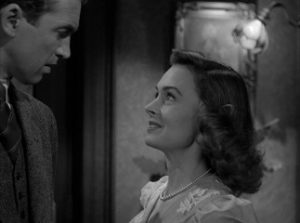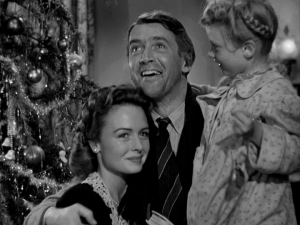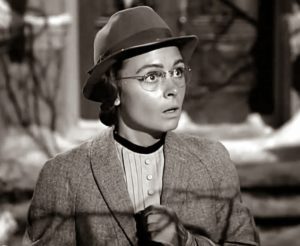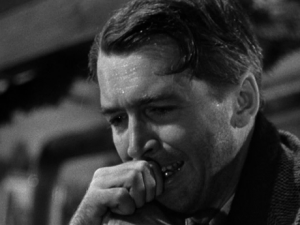One and Only: The Fate of Mary Hatch in It’s a Wonderful Life
If you know me personally, you will realize right off the bat that you’re walking into a rant. Ten words or less: I hate, hate, HATE It’s a Wonderful Life. There’s really not much more I can say about that. No, wait – there IS! One of the many things I dislike about this film (because I have no soul) is the treatment of Mary Hatch-Bailey (Donna Reed), the love interest. We need to have a conversation about Mary, gang.

Oh honey.
Let’s start first with her backstory. Mary has been in love with George (James Stewart) from girlhood. As time goes on, George focuses on the duties he has: namely, running Bailey Brothers’ Building and Loan, which his brother has skipped out on in favor of a new job opportunity thanks to his new father-in-law. Despite the fact that Mary is dating someone else, George pays her a visit, they realize they’re in love, and they get hitched. Mary good-naturedly pitches in her honeymoon funds in order to keep the town afloat during a bank panic. She raises the four children she has with George while supporting his endeavors to bring financial fairness to the town. She repairs a run-down mansion to make it into her dream home; she works with the USO during World War II, and she offers kindness when her husband goes through financial crisis with the missing $8,000. She’s also Donna freaking Reed, which means she does this while looking and sounding like the most perfect woman on the planet (as a long-time fan of The Donna Reed Show, I can back up that this woman truly was perfection for me as a child). Mary is a saint walking amongst us. She’s selfless and kind and altogether extraordinary, then she’s in that exterior wrapper. She’s totally an ideal and we expect nothing less for our do-gooder hero.

You can have it all because she props you up, George.
So what’s the problem with our stoic Mary Sue? Well, that occurs on the alternate timeline, wherein George wishes he had never been born. We find out that Mary never loved anyone like she loved George. In fact, Mary not only never married or had kids, but she went the route of the conservative, unattractive spinster librarian. Mary goes from a beautiful, intelligent woman with a lot of heart to a shy, mousy, physically unappealing woman who distrusts men. Clarence (Henry Travers) bemoans that she’s “an old maid,” after which we’re supposed to gasp, clutch our pearls and scream, “WHY?!” We’re supposed to pity this woman because she’s not married, doesn’t have kids, and hasn’t figured out the mechanics of blush and mascara. Clarence implies that she missed out on her chance at happiness by not getting married, as evidenced in the way that she screams and runs when a man she doesn’t fucking know starts chasing after her (demanding that he needs her and wants to know where the kids are). She went from vibrant and loving to plain and distrusting. Nevermind that in this reality, she has some stranger stalking her on the streets and is justifiably scared. Librarian Mary is one of the great tragedies of George not being born – his existence impacts the core of happiness for this woman, in everything from profession to personality to life goal achievement. Per this example, without a good man, you can’t be physically beautiful, have a decent personality, or any form of aspirations whatsoever. The worst thing you can ever be, according to an agent of Heaven, is middle-aged, unmarried and childless.

Meltdown in three… two… one…
Bull. Fucking. Shit. Yes, this film is a reflection of the social attitudes of the time, but really?! You really, truly expect me to believe that Donna Fucking Reed could not have found love without the presence of one person (a complete workaholic that places perceived duty above everything else at that)? The implications of this timeline are horrifying: Mary’s entire personality and appearance change, which means that she’s only a good, beautiful person inside and out because George happens to be around. Without him, she lacks any individuality and spark that draws George to her in the first place. It implies that she exists only to be there for George – without him, she’s just a wallflower that has not achieved the social goals of marriage and children, let alone the personality warmth that formed in her childhood. And really, why couldn’t Mary have had a successful, fulfilling life without those things? She still could have led a war effort. She was smart – she certainly could have been one of the pioneers of medicine or science or human rights. She still could have pitched in money when the town panicked over their finances. She could have styled her hair nicely and slapped on some lipstick because she wanted to, not necessarily to land a man, but out of pure choice (being conventionally beautiful isn’t a qualification for love, after all). On that note, most likely, someone would have wanted to be with her – her options were not George Or Bust, as the character Sam smugly insinuated. Librarian Mary honestly looks like she’s wicked smart and suffers no fools, which means she’s totally got someone macking on her. She could have been Mary Hatch because Mary Hatch should exist outside of George Bailey – Mary should function as a partner for George, not a component of his personality and achievements. There’s not even an ability to smile when you take away George, which is sad because it means that a world that has a lot of simple beauty registers no impact on her. That’s not a life, and it’s not plausible to think that that much of one’s personality is dependent upon a mate. To think that this amazing woman simply stops being who she is because a particular man doesn’t come around to gift her with marriage and babies is fucking insulting on so many levels. It implies that women aren’t nearly as good on their own – they absolutely require a man in order to reach their peak potential. Still, the greatest condemnation here isn’t on her. This scenario doesn’t so much speak about Mary as it does about George: it’s his need to feel important that robs her of an identity. Mary can’t exist as she is without any outside influence – she can’t be beautiful or smart or liked by others without him; she’s got to be a lonely spinster that wastes away on her own when he’s not around because she exists to give his life meaning. George needs someone to tell him he’s special, to make him dinner and raise his kids and get behind every single ideal he has, even when it means that she forgoes her own wants. For fuck’s sake, he even requires an angel come around to tell him how much he matters. A divine being has to reassure George Bailey that he’s indispensable and the most special creature that ever walked the earth. That’s a level of neediness that beggars belief.

“But… how else will I be validated?”
This entire business works to create a pretty nasty ideal. Mary can either be one of two options: the perfect, attractive, supportive partner of our hero, or the lonely, languishing, shy librarian. There’s no in-between, no middle ground for her: she’s either the most perfect woman in the world, or a giant disaster. The real crux of the scenario is whether or not she has George in her life, which makes the distinction between attractive happiness versus unattractive solitude. This isn’t what we should be looking up to at a vulnerable time of the year. Mary shouldn’t exist to make George better, nor should he bear that responsibility for her – they should bring out the best in one another from something that already exists. To insist otherwise means that they’re not really people; just props. There’s nothing aspirational or wonderful about that life.

A single woman “of a certain age”, I wish I had written this piece, which perfectly describes in detail why I absolutely detest IAWL with a passion. Growing up in the generation after this movie was filmed, I was taught to fear becoming a prim, unattractive, joyless, anxiety-ridden “old maid” and only the love of a man could save me from that terrible fate. Since no such man did materialize in my life, I am fortunate that things have changed since then. That being said, the awful characterization of Mary Hatch’s life of desolation in the alternate universe of Pottersville makes this movie infuriating, depressing and painful to watch. So, every Christmas — when it is invariably on — I make a strenuous effort to avoid it at all costs.
If it makes you feel any better, that mindset carried over into the 1980s, when I was a kid. We watched a lot of our mothers and aunts wind up with people they couldn’t stand for that reason, and I think it’s a huge part of why so many of us said, “I’d rather be by myself than with some asshat.” (Fun fact: a spinster originally wasn’t a bad thing — she as a woman who learned a trade and earned enough money to not need a husband, and family would often coming crawling to her for a handout. That knowledge tickled me pink.) What this long, rambling statement is meant to say: I’m so sorry that people made you feel that way. We’re working on making sure no one else has to feel that. I think that’s why I wrote this — Mary deserved way better than being George’s personal life coach.